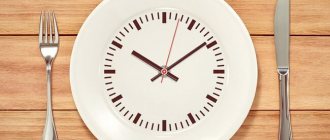General information
For those who want to feel more alert and healthy, as well as get rid of extra pounds, modern doctors and adherents of alternative medicine offer many different techniques. One of them is water fasting , which is also called wet fasting.
Water fasting is a process when a person refuses to consume any food for a long time, but at the same time drinks water in unlimited quantities. There is still debate about how effective this method is and the benefits of water fasting. But numerous reviews indicate that with the right approach to this process you can get tangible benefits. How to fast on water correctly, what are the benefits and harms of this method and what results can be obtained by abstaining from food will be discussed in this article.
How not to cause harm
Fasting is not a panacea and there are diseases for which it cannot help. Consult your doctor and review the list of diseases for which fasting is contraindicated.
There's no point in starving if you're going to binge on food the next day. This will negate the results and be a strong blow to digestion. Therefore, you need to approach fasting with a clear understanding of why and knowledge of the rules.
Assess your capabilities. Long-term fasting is not recommended unless you have experienced at least several short fasts.
Fasting is the shortest way to restore health, rejuvenate the body and cleanse the soul
Goltis
Author of the “Healing Impulse” method, fasted on water for 54 days
How many days can you live without food?
Despite the seemingly unambiguous nature of the proposed answer, there are different opinions on this matter. Some sources indicate that a person can live up to 2 months without food, provided they consume water. However, this indicator is influenced by various factors - climate, age, initial weight, health status, etc.
But this does not mean that after such a long hunger the body will be able to recover to its normal state. Scientists claim that after just a week without food, active destruction of muscle tissue begins, and after two weeks, tissue destruction of vital organs occurs. Therefore, fasting for 21 days, which some sources describe as a possible recovery option, can become deadly.
What else do experts say?
Received the Nobel Prize in Physiology or Medicine for autophagy in 2021. Osumi proved that due to hunger, the body starts the process of self-consuming cellular debris, bacteria and viruses. It gets the raw materials to work by destroying old cells, which once again proved the benefits of fasting for humans.
Yoshinori Ohsumi
Molecular biologist
Author of the book “Fasting for Health.” Nikolaev spent ten years studying the positive effects of hunger on hypertension, diabetes, arthrosis, ulcers, gastritis, asthma, obesity and other diseases. The scientist called his method fasting-dietary therapy (RDT), so as not to frighten science and people in the post-war years with the terrible word “hunger.”
Yuri Nikolaev
Psychologist, Doctor of Medical Sciences
Promoted the benefits of fasting in the 50s in America. In the book “The Miracle of Fasting”, he uses his own example to tell how he fasted once a week and 4 times a year he refused food for 7 days. He died at the age of 81, but not from old age. He was hit by a giant wave while surfing off the coast of Florida.
Paul Bragg
Health Promoter
Fasting is a powerful stress for the body, but at the same time it activates a protective reaction, stimulates renewal and rejuvenation of the body
How does hunger work?
Therapeutic fasting is based on the fact that during abstinence from food the body is gradually cleansed. First of all, the gastrointestinal tract is cleansed of toxins. Adherents of this technique argue that the energy that the body habitually spends on digesting food during periods of hunger allows one to activate hidden functions, thereby ensuring rejuvenation and healing. There is also an opinion that this method can significantly increase immunity.
What happens when a person stops eating and “sits” on the water for a while? In such a situation, the body is forced to meet internal energy needs using accumulated reserves. If food is absent, the body initially uses up reserves of glycogen , fats , and later proteins from tissues. After a few days of fasting, the body begins to produce the fatty acid ketone , an excessive amount of which is harmful to the body.
Gradually, during hunger, valuable proteins are destroyed, which is an extremely undesirable process. That is why long-term fasting cannot be practiced uncontrollably.
Water fasting is prescribed in medical institutions as a preventive and therapeutic method. When answering the question of how long you can fast on water, experts always say that abstaining from food, even for several days, is a serious stress for the body.
In medicine, fasting is practiced for a period of 1 to 5 days. As a rule, fasting is prescribed to patients before and after surgery, as well as to people with food allergies and acute pancreatitis .
As for longer periods of fasting, it can be maintained in special conditions to ensure that resuscitation measures can be quickly provided. To reduce stress on the body, for longer periods, so-called cascade fasting , when days of abstaining from food alternate with days when a person eats.
Therefore, this healing method can be practiced at home without fear only if the period of abstinence from food does not exceed 2 days. The optimal option for unloading the body is fasting on water for 1 day. One-day fasting makes it possible to provide the body with general health and necessary cleansing. But even in this case, it is important to take into account all contraindications.
Intermittent fasting: how to start correctly: expert advice
Before switching to cyclic fasting, beginners should learn a number of simple rules, adherence to which will help achieve impressive results in the shortest possible time. Olesya Kokorina gives the following recommendations:
• Prohibited: baked goods, sweets, fast food, too salty foods. But, oddly enough, sometimes you can pamper yourself with fried and fatty meat.
“You can do a lot with intermittent fasting,” explains the expert, “but, of course, there are also prohibited foods. Sweets, fast carbohydrates and baked goods are definitely on the stop list. The system doesn’t work magically, and you always have to sacrifice something for the sake of a beautiful figure.”
• One eating window includes a maximum of three full meals without snacks.
• Many people are interested in the question of whether it is possible to drink coffee or tea during intermittent fasting. The answer is clear. You will have to come to terms with this, but during times of hunger only water is allowed. Even tea and coffee without sugar are prohibited, not to mention juices, compotes and other sweet drinks, which in principle are best not consumed by those who want to lose weight.
• Speaking of water. Staying hydrated is extremely important both for overall health and for maintaining yourself in excellent physical shape. It is recommended for an adult to drink 1.5 - 2 liters of pure still water per day. The norm is indicated without taking into account other liquids (soups, broths, kefir, tea, coffee, herbal decoction, etc.). Water triggers important metabolic processes in the body and can block acute attacks of hunger, thereby promoting weight loss.
• The most important rule: don't eat if you're not hungry! Even if the food window is about to close, do not try to eat for future use. Remember: fewer calories - better results.
• No matter what they write on the Internet, there are simply no intermittent fasting schemes based on your body type.
• Schemes for men and women also do not differ significantly. The only difference may be the maximum permissible caloric intake during the hours allowed for eating.
• There are a variety of intermittent fasting schemes: - 4/20 - 10/14 - 12/12 - 6/18 - 1/23 - 8/16.
“There are also long-term fasts,” comments Olesya Kokorina, “but the most “working” and popular is 16/8, where the first number is the period of hunger, and the second is the eating window. It is believed that this alternation is the easiest to tolerate and is suitable even for beginners.”
• Fasting for 16 hours may seem like too much of a challenge at first, so you can gradually prepare your body for the upcoming “deprivation” by gradually reducing your eating window every day, for example, by stopping to eat after 6 pm to start if you are used to having breakfast early. If your first meal occurs no earlier than 12 noon, then dinner may be later. The main thing is not to eat for 16 hours in a row, and when exactly this happens is not so important.
• It just so happens that one part of the “hunger strike” occurs during sleep, and the other during wakefulness. When you are not sleeping, try to occupy yourself with something not related to food: sports, playing with children, work, a favorite hobby. Put off preparing pickles for your family until the next eating window.
• The period of adaptation to a new regime takes on average 7 to 10 days.
• There is an opinion that during the permitted hours you can eat whatever your heart desires, but this is wrong. Firstly, with this approach you should not expect impressive results, and the “sacrifice” will be in vain, and secondly, sudden transitions from unhealthy foods to hunger and back will definitely not please your gastrointestinal tract. You need to start intermittent fasting right away with the right foods, trying not to indulge in buns and chocolates during the hours allowed for eating.
pixabay.com/Joenomias
Types of hunger on water
- From the point of view of the goals of the process of abstinence from food, a distinction is made between therapeutic and preventive fasting.
- From the point of view of fluid intake, they distinguish: complete abstinence from food with unlimited water consumption and combined - with alternating water and dry fasting.
- In terms of duration, they are distinguished: short - 1-2 days, medium - 3-7 days, long - from 8 days.
What happens to the body
Hunger is an extraordinary stressor for the body. Especially if this happens for the first time, using the maximum time frame. Beginners are not recommended to use the 30-day diet without prior preparation.
Read also: Constipation in infants: a review of folk remedies to eliminate the problem
The body needs food to function properly. Necessary vitamins and microelements are taken from food and converted into energy. If the amount of incoming fat exceeds the wasted energy, they are deposited in the body.
The essence of fasting consists of 3 stages:
- The first is the anxiety stage. 1-4 days of fasting. Food stimulation occurs. The person experiences severe bouts of hunger. Pain occurs in the intestines. Headache, dizziness, and nervousness are observed. The person partially loses concentration and cannot concentrate. Apathy and a dejected mood appear. Daily weight loss is 1 – 2 kilograms.
- The second is the stage of restructuring. From day 5 of fasting. The feeling of hunger is dulled. A characteristic acetone odor appears from the oral cavity. In some cases, the effect of a coated tongue appears. A person quickly gets tired, feels weak in the muscles and throughout the body. There is constant drowsiness, which comes to save energy. Heart rate and blood pressure decrease. Hungry fainting is possible. Weight loss 300 -700 grams.
- The third is the adaptation stage. From 26 to the thirtieth day of fasting. The person returns to normal mood and gains strength. The coating on the tongue disappears. The sclera of the eyes becomes white (sometimes bluish) in color. The condition of the facial skin improves, and a healthy appearance of the skin appears. Weight loss 200 – 500 grams per day.
In order to prevent exhaustion of the body or complications, before starting the diet you must undergo an examination and be under the supervision of a specialist.
Contraindications
There are a number of diseases and conditions in which abstinence from food should never be practiced:
- underweight;
- oncological processes;
- active tuberculosis
- diabetes mellitus type I;
- bronchiectasis;
- diseases of the circulatory system;
- thyrotoxicosis;
- diseases of the heart, liver, kidneys;
- thrombophlebitis;
- nervous exhaustion;
- pregnancy, lactation;
- encephalopathy.
Who should not lose weight with intermittent fasting?
Despite the fact that this system clearly brings more benefit to the body than harm, there are certain categories of people for whom it is highly not recommended to adhere to it.
The main contraindications include the following:
• Diabetes, especially type I. • Body weight deficiency. During periods of hunger strike, the body replenishes the energy reserves it needs from its own resources, which can lead to exhaustion. • Thyrotoxicosis and other diseases of the thyroid gland associated with increased production of hormones. • Pathologies of the liver and kidneys. • Ulcers and other acute diseases of the stomach and duodenum. • ARVI, flu - an already weakened body does not need unnecessary stress at all. • Serious cardiac problems in acute and chronic form. • Atrial fibrillation. It is not an absolute contraindication, but during periods of hunger it is necessary to closely monitor that the level of potassium and magnesium in the blood is normal, which is quite difficult. • Gout. • Tuberculosis. • Oncology. • Pregnancy and breastfeeding. • Age up to 18 years. • Various mental disorders. • Recovery period after major surgical interventions.
Important! Before you start, it is advisable to undergo a standard medical examination (ultrasound of internal organs, ECG, general and clinical blood and urine tests) to make sure there are no contraindications, and also consult with your doctor.
pixabay.com/
Benefits and harms
Provided that a person strictly adheres to all the rules of preventive fasting and practices it regularly, he can receive a number of positive effects.
- Improving skin condition, cleansing the skin from allergic manifestations, acne .
- Weight loss, figure improvement.
- Strengthening the immune system .
- Activation of metabolism .
- Improving the functioning of the digestive system.
- Reducing the amount of food consumed.
- General health.
But, given the wrong approach to hunger and excessive enthusiasm for this technique, you can get a lot of negative consequences.
- Exacerbation of chronic diseases.
- Development of new unpleasant symptoms and diseases.
- The return of extra pounds after the end of the fast.
- Significant loss of muscle mass.
- Psychological immunity to hunger.
- Cosmetological problems - hair loss, thinning skin.
- Vitamin deficiency and deficiency of vital substances.
- Decreased libido.
- Health problems after returning to the previous diet.
What results can be achieved with a 30 day fast?
It is important for a person who uses the fasting technique that the final results justify the work done. Statistical data confirms that when fasting, a person loses excess body weight and significantly improves the condition of his own body.
From a review from a regular reader:
“I have long heard about this method of losing weight, which involves 30 days without food. This seemed to me an absurd, dangerous way. I tried more gentle methods - sports, various medications. Results were achieved, but with difficulty. At work, one girl simply began to melt before our eyes. Everything turned out to be much simpler - she was starving. She told me that she hasn’t eaten anything for 2 weeks, and she only has WATER in her diet! To my surprise there was no chance, I decided to try.
To say that it was hard is to say nothing. Especially the first days. The only thing on my mind was food. Sometimes I woke up in the middle of the night (I couldn’t stand it) with only one thought – to eat. How many times have I said to myself - fuck it! And then she drove away the evil thoughts. She reassured me that the result was worth suffering a little. After about a week, my body calmed down, and fasting became much easier. I didn’t feel like eating, and sometimes I felt nauseous from the pungent smells of the former deliciousness.
At the start of the hunger strike, I weighed 72 kilograms. Now, a month later, I’m 55. Of course, I limit myself to some foods. I try to eat a balanced diet, little by little. But such a shake-up was beneficial. I feel great. It became easier to breathe. Night snoring has disappeared. Physical activity does not bring such fatigue.
Irina B. 30 years old, Samara"
Basic Rules
Those who are interested in how to properly fast on water should know the important rules and take into account all the recommendations.
Beginners should not fast for more than one day. Fasting for one day will not be difficult even for those who are doing it for the first time. This will be beneficial for the body, and at the same time it will not experience significant stress.
It is recommended to fast for preventive purposes several times a year, provided that the person practices longer abstinence from food. As for one-day fasting, you can adhere to it more often - once every 2-3 weeks.
The correct entrance and, even more so, the correct exit from hunger are very important. Initially, a person must be prepared to carry out this procedure. To do this, you should read authoritative sources and choose the optimal time for this practice. It is best to fast on the weekend, so that on this day you can not work intellectually and physically, but do interesting things that distract you from thoughts about food.
A few days before it starts, you should stop drinking alcohol, smoking and eating heavy food. It is best to prepare light meals, ideally plant-based. The day before the procedure, you can cleanse the intestines by giving an enema or drinking laxative tea.
Directly on the day of fasting, you should drink water at room temperature throughout the day. The water must be mineral (still, not salty) or distilled. You can drink water in any quantity – as much as you want.
It is best to start the procedure in the evening. At about 6 p.m., you should eat a light meal for dinner, after which you should completely abstain from food for the duration of your fast. That is, over the next day a person drinks only water, and in the morning of the next day he begins a gradual recovery from hunger.
In the process of exiting, the most important thing is to do it gradually, without starting to eat everything at once. Meals should be light and small. In the morning after fasting, you can first drink fresh juice, slightly diluted with water. After some time, it is recommended to eat an apple. Then, after 2 hours, you can eat a small portion of porridge with water and a vegetable salad. For another three days, it is better to minimize salt and not eat protein foods - then the effect of hunger will be maximum.
Only after a person has abstained from food for one day several times can he try fasting for 2 or 3 days. However, a three-day abstinence from food is a more serious stress for the body, so you need to prepare for it longer and be more careful in getting out of hunger. After three days without food, it is recommended to begin returning to a normal diet of juices diluted with water. But it is best to try a 3-day fast after a visit to the doctor and taking into account his recommendations.
On the Internet you can find many descriptions of the process of fasting for 7 days from users who claim that this method helped them not only lose weight, but also overcome many diseases. However, weekly water fasting should never be practiced by beginners. And even people with experience should not do this without the supervision of a doctor, since such experiments are fraught with deterioration in well-being and can lead to the development of diseases.
Intermittent fasting: what to eat, menu for beginners for a week
One of the significant advantages of this nutrition system is that there is no need to adhere to a strict menu, however, to make it easier for beginners to navigate, we will still give an example of a weekly diet that everyone can vary depending on their needs and taste preferences.
MONDAY
Breakfast: Cottage cheese with fresh berries, whole grain bread, coffee without sugar Lunch: Chicken broth, a piece of fried chicken with vegetable salad Dinner: Salmon steak, broccoli
TUESDAY
Breakfast: Oatmeal (1-2 eggs + 50 ml milk + 30 g oatmeal) stuffed with cottage cheese, tomato and a slice of baked chicken breast, tea/coffee Lunch: Broccoli soup Dinner: Turkey cutlet with grated zucchini, salad tomatoes, cucumbers and avocado with olives
WEDNESDAY
Breakfast: Sandwich of whole grain bread, avocado (mash the pulp with a fork and sprinkle a little lemon juice) and a piece of lightly salted salmon, tea/coffee Lunch: Vegetable soup with meat broth Dinner: Pilaf with bulgur (rice is prohibited during intermittent fasting!)
THURSDAY
Breakfast: Oatmeal with fresh fruit, tea/coffee Lunch: Stuffed peppers Dinner: Oven-baked chicken, vegetable salad
FRIDAY
Breakfast: Two boiled eggs or fried eggs, toast, a slice of chicken breast Lunch: Borscht Dinner: Stewed cabbage with meat
SATURDAY
Breakfast: Cottage cheese casserole with berries, tea, coffee Lunch: Mushroom soup Dinner: Beef steak, fried green beans
SUNDAY
Breakfast: Omelette with vegetables and a piece of cheese, tea/coffee Lunch: Fatty sea fish soup Dinner: Cauliflower casserole with cheese
“Intermittent fasting is a way of life,” Olesya Kokorina concludes her story, “and if you always adhere to this system, you will not only be beautiful, but also healthy for many years!”
Juice fasting
A more gentle method of healing is juice fasting, when, unlike “traditional” fasting, the body receives many useful substances. Therefore, it is easier to carry. Juices are easily digestible, so the digestive system rests quite successfully during the period when juice abstinence from food is practiced.
Using this method, you can not only effectively lose weight, but also improve your body health. Consuming juices makes it possible to tone the intestinal mucosa, regenerate damaged cells, remove toxins , and improve the functioning of the excretory system.
During this period, it is recommended to consume cabbage, beet, and carrot juices. But you also need to include fresh berry, fruit and other vegetable juices in your diet. If such a drink is too concentrated, it is better to dilute it with water. You can also mix juices. If you are thirsty, you can drink some water.
You can fast on juices for 2 to 5 days, but it is better to start with one day of fasting.
As with normal fasting, you should enter the fasting process correctly by eating light food for several days.
The output must also be correct. Under no circumstances should you overload the digestive system. It is better to start with soft fruits, then switch to boiled vegetables, and later add liquid porridge to the menu. You can return to your normal diet after a few days.
Starvation
The fasting method itself follows a standard scenario - any food other than water is prohibited. Thus, the body switches to internal nutrition. The systems utilize accumulated resources in the form of adipose tissue and dead/damaged cells. As a result, all “garbage” is removed and the organs are restored.
Interesting fact. In order not to break down, during fasting we occupy our free time with our favorite activities, try to walk and sleep more often. Serious physical activity should be avoided.
Important points
- You cannot practice this method if your temperature or blood pressure has increased, you have cold , or you feel unwell. It's better to wait for a more convenient time.
- If during fasting a person breaks down due to certain reasons, then it is worth postponing this process for a while and trying again later.
- If you experience a headache during hunger, you should not worry about it. As a rule, this symptom bothers you in the second half of the first day of abstinence from food and goes away on its own. But if the pain becomes unbearable, it is necessary to stop the fasting process.
- Dizziness are also considered normal symptoms . But these symptoms should not be very strong and debilitating. If this still happens, you should consult a doctor.
- During the period of abstinence from food, it is best to do something that arouses interest and brings pleasure. Light exercises are also recommended - yoga, Pilates, swimming. But you can’t overexert yourself.
- Under no circumstances should you starve uncontrollably. This mistake is often made by those who are trying to lose weight, and thereby seriously harm the body.
How the body reacts
The reasons for fasting can be different. My main goal is a healthy and slim body. Let me tell you about how fasting affects me:
- A clear result of fasting is weight loss. Even in one day the swelling and stomach go away. Weight is about 500-1200 grams. This is not fat, and the next day you will gain weight, but this difference motivates you not to give up.
- Six years ago I had acne on my face. I treated the rashes with hormonal pills and creams, but it didn’t help. Within a year of practicing fasting, my facial skin became smooth and my acne went away. A healthy complexion and blush appeared.
- Switch to proper nutrition. There is no desire to eat sweets or indulge in fast food. This is the biggest bonus for me, considering that I have a sweet tooth.
- I tolerate illnesses and colds more easily. I don’t take pills or antibiotics; my body copes with the virus on its own in 2-3 days.
- A year later, the headaches, which had previously been chronic, stopped.
- I realized that the body does not need as much food to function as we are used to eating. The feeling of fullness comes on time.
During 39 hours of fasting, 1100 grams of excess liquid and toxins were lost
The maximum I was able to do was stay on the water for 3 days, after which I didn’t want to go back to fasting for another six months. Now I fast once every 3-4 weeks, but every month. It’s physically and psychologically easier, and the effect of weekly fasting for a year is equivalent to long-term fasting.
The frequency of fasting depends on the timing. More days on the water means longer breaks between unloadings
Water fasting: reviews and results
Most people who talk about their experience of fasting note a very important point: before fasting, it is important to study the essence of this method, the rules of its practice, as well as determine goals for yourself and tune in to the process. If you read reviews about one-day fasting on water, then those for whom this method has already become part of their life rhythm have actually managed to significantly lose weight and improve their health. If you carry out a one-day abstinence from food regularly - once every 2-3 weeks, then gradually the body adjusts to such a “schedule”, and thanks to this the person begins to eat less, which leads to excess weight . The most important advantage of this technique is that one day of fasting is not dangerous to health.
You can also find many reviews about juice fasting, which is often practiced for 3 days or longer. This technique has also helped many. But some reviews say that hunger for juices provoked a sharp deterioration in health and digestive problems. This indicates that this technique is only suitable for those who do not have health problems.
You can also find reviews from those who fasted at home for 7 days or 10 days. But, despite some enthusiastic descriptions of sensations and results, it is important to realize that long-term fasting is only possible in a hospital setting with constant supervision by specialists.
If you analyze individual reviews that describe the results of 21 days of abstinence from food, you may mistakenly believe that this is a simple process during which you can get rid of 10 or more kilograms of excess weight and feel great. But in fact, this is an extremely dangerous technique, and you cannot be guided by reviews in this case.
It is important to understand that each specific case requires only an individual approach, and one should gradually get used to regular “sessions” of hunger, starting with the simplest.
Pros of fasting
A 10-day voluntary refusal to eat has enormous benefits for the body:
- Restoration of the heart muscle.
- Healthy sleep.
- Prevention and treatment of various diseases.
- Complete cleansing of the body from toxic substances.
- Feeling better.
- Clearing your mind.
- Improving immunity.
- Acceleration of metabolism.
There are practically no downsides to therapeutic fasting. They are associated with side effects, as well as some contraindications.
If, at the end of the hunger strike, a person cannot touch food, it is necessary to urgently visit a doctor. Without food, the body will not survive in the future. Death is possible, and it is important to prevent it.











